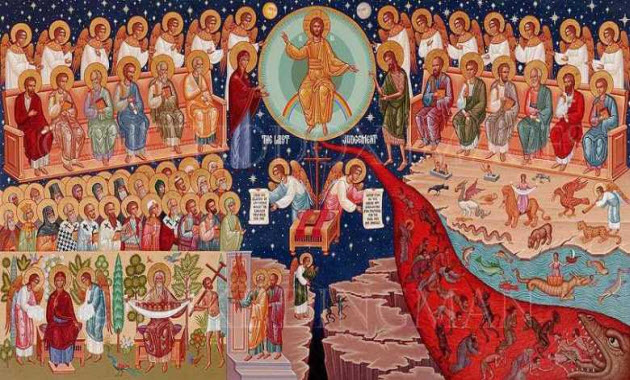Pope Pius XI's motive to institute this solemnity was to remind us of our need to live a Christ-centered life. If not to live a life centered in Christ, obedient to his law, then, our life would be driven by our own egocentric desires, often resulting in conflicts and injustice. The state of the world in 1925, as Pope Pius XI saw it, was where many people and nations had thrust Christ out. To prevent the world from a destruction due to conflict and injustice, he called the world to put a focus on Christ, the ultimate King, the King of the Universe, whose rule and Kingdom is eternal.
Pope Pius XI wrote:
In the first Encyclical Letter (Ubi arcano Dei consilio)
Quas Primas, paragraph 1
As envisioned prophetically in Revelation 19:11-16, Christ will return as the King of the Universe to bring ultimate justice to rule his Kingdom with eternal peace. Upon his return to the world, nothing will go against Christ's holy law. Only those who remain faithful to him and his law will enjoy the New Heaven and Earth in his eternal Kingdom, as described in Revelation 21 and 22.
On Cycle C, the first reading for Christ the King of the Universe Solemnity is taken from 2 Samuel 5:1-3. It is about David was being recognized as the King of Israel, upon rejecting his predecessor, Saul, for the sake of peace and justice of Israel. Saul proved that he was not good enough to serve as a king. As the Israelites replaced Saul with David for their king, they showed their unity with David, saying, "Here we are, your bone and your flesh"(2 Samuel 5:1).
Now, we have Christ as our King, and because by virtues of the Sacraments of initiation (Baptism, Eucharist, and Confirmation), we are eligible to inherit the Kingdom that he reigns eternally. For us not to forfeit the Kingdom, though, we must remain united with our King as his "bone and flesh".
In fact, our King has expressed his desire for us to remain with and in him as the branches are firmly attached to the vine so that we may be fruitful, bearing good fruits (John 15:1-17), in reiterating his desire to be united as one with us (John 14:20) metaphorically.
The Gospel reading for the Solemnity of Christ the King on Cycle C, Luke 23:35-43, describes Christ as a rejected king by the world. This Lucan Gospel narrative echoes Jesus' parable of tenant vineyard workers in Matthew 21:33-45, in which Christ was rejected and killed by people of this world. And, they are the ones mocking and putting Christ to death, along with two other men.
There are very interesting lines in the Gospel reading (Luke 23:35-43), because there is one man, who saw the crucified Christ as the King, and asking him to remember him as he comes to his Kingdom (Luke 23:42). This man was condemned by the world, which also condemned the King. However, the King condemned by the world proclaimed, "Amen, I say to you, today you will be with me in Paradise"(Luke 23:43).

What does this remind us?
It is not the world or its political leaders to decide who are to be saved or who are to be condemned. Out salvation or condemnation is not really based on laws of nations but the law of Christ the King. That is why Pope Pius XI in his Quas Primas, echoing Ubi arcano Dei consilio, instituted the Solemnity of Christ the King of the Universe, to call for our attention to bring our heart's focus on Christ and his law for our salvation.
To be with Christ as one means to acknolwedge him as the King of the Universe, whose throne is at the right hand of the Father in heaven, and whose Kingdom is eternal. Then, we need to humbly surrender ourselves totally to this King, acknowledging our offenses, as one of the crucified man next to Christ did, even just before his death. The Sacraments of Initiation are to help us keep our vision on the King and to be his "bone and flesh", especially, through the Eucharist.
Two other men were crucified with Christ. One did not recognize Christ. Thus he mocked the King. The other one, however, rebuked the first one for mocking Christ and recognized him as the King, in asking him to remember him, too, in the Kingdom.
Whine one will we be, when he returns to judge, as reflected in Revelation 19? Like the one who rejected and mocked Christ? Or, the one who acknolwedged Christ and asked him to remember?
As long as we remain as "bone and flesh" of our King - remaining one with our King, we will find ourselves in the Paradise with him.

The King will come to harvest the good fruits of the seed that he has sown. As we remain with him like the branches securely attached to the vine, the seed, which is the Word of God, will turn into abundant multifaceted fruit, as in the fruit of the Holy Spirit (Galatians 5:22-23), helping us fight against vices. Remember, the seed that Christ the King has sown is loaded with the Holy Spirit (1 Thessalonians 1:5).
What fruits will we be offering to the King in order to enter into the Kingdom with him? As we can say, "Jesus, remember us when you come into your Kingdom", we are in peace, even condemned by the world. Therefore, we are bound to the Kingdom, where there is peace.
No comments:
Post a Comment